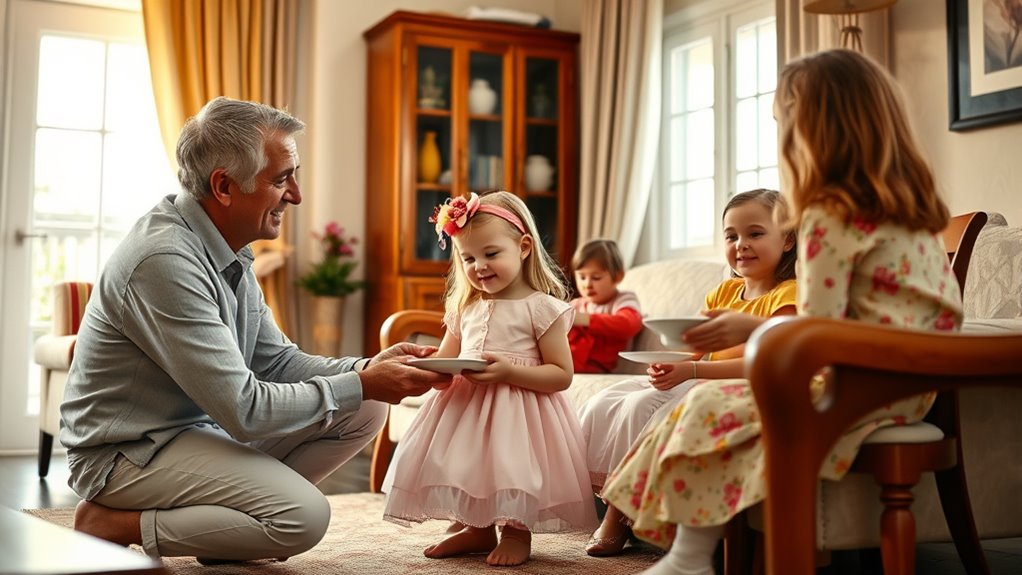To help your kids navigate family gatherings and socialize confidently, focus on building their trust and teaching respectful manners. Model polite behavior like saying “please” and “thank you,” and encourage them to practice greetings and conversation skills through role-play. Remind them that mistakes are normal and reinforce their efforts with positive feedback. As you support their emotional comfort, they’ll become more confident at family events—keep exploring these strategies to get even better results.
Key Takeaways
- Model respectful behavior and polite communication to set a positive example for children during family interactions.
- Practice social scenarios like greetings and introductions through role-playing to boost children’s confidence.
- Reinforce the use of manners such as “please,” “thank you,” and “excuse me” to promote courteous interactions.
- Support children’s emotional comfort by acknowledging feelings of shyness and encouraging patience and positive reinforcement.
- Create a trusting environment by setting clear expectations and celebrating efforts to communicate politely and confidently.

Family gatherings can be overwhelming for kids, especially when they’re still learning social norms. As a parent or caregiver, you can help your child feel more comfortable by focusing on trust building and polite communication. When kids trust the adults around them, they’re more likely to participate confidently and express themselves without fear. Trust building involves creating a safe environment where your child knows they’re supported, heard, and respected. This starts with setting clear expectations and modeling respectful behavior yourself. When your child sees you engaging politely with relatives and handling social situations gracefully, they’re more inclined to mimic those actions. Encourage your child to approach conversations with kindness and patience, emphasizing that it’s okay to ask for help or clarification if they’re unsure about what to say or do.
Polite communication is key to steering family gatherings smoothly. Teach your child simple phrases like “please,” “thank you,” and “excuse me,” and explain why these manners matter. Demonstrating these phrases during interactions helps your child understand their importance and makes it easier for them to incorporate polite communication naturally. When they speak kindly, listen attentively, and show genuine interest, they build positive relationships with relatives. Remind your child to make eye contact when talking and to wait their turn in conversations. These small but significant habits foster respect and contribute to a friendly atmosphere. If your child feels unsure about how to respond in social situations, role-play different scenarios beforehand. Practice saying hello, introducing themselves, or asking for help politely. This practice boosts confidence and helps them develop a sense of trust that they can handle social interactions.
It’s also important to reassure your child that it’s okay to feel shy or uncertain. Highlight that everyone makes mistakes, and that’s part of learning social norms. When they stumble, encourage them to apologize if needed and to try again next time. Celebrate their efforts to communicate politely, as positive reinforcement strengthens their confidence. Additionally, incorporating technology like AI can help children learn social cues and etiquette in a safe, engaging way. Over time, these small steps will help your child feel more at ease during family gatherings. Remember, building trust and teaching polite communication are ongoing processes. Be patient, offer plenty of encouragement, and acknowledge their progress. By doing so, you’re helping your child develop the social skills they need to enjoy family events and connect with relatives in a meaningful, respectful way.
Frequently Asked Questions
How Can I Teach My Child to Handle Unexpected Social Situations?
You can teach your child to handle unexpected social situations by practicing role-playing scenarios with them, so they learn appropriate responses. Encourage teaching empathy by discussing how others might feel in different situations, helping your child understand different perspectives. Remind them to stay calm, listen carefully, and be respectful, even if they feel uncomfortable. These strategies build confidence and social skills, preparing them to manage surprises with poise.
What Are Some Strategies for Managing Shy or Introverted Kids at Gatherings?
Think of your shy child as a delicate seedling needing gentle sunlight. To manage their comfort, build confidence gradually by encouraging participation in small, familiar conversations. Create a safe space where they feel valued, like watering the roots of a plant. Respect their pace, offer reassuring words, and celebrate small wins. Over time, they’ll blossom, knowing you’re there to support every step of their growth in social settings.
How Do I Address Sibling Conflicts During Family Events?
To address sibling conflicts during family events, step in with sibling conflict resolution skills like calmly listening to each child’s perspective and encouraging them to express their feelings. Promote family harmony strategies by reminding everyone of shared bonds and the importance of kindness. Set clear boundaries beforehand, and if conflicts arise, intervene gently but firmly, guiding kids toward understanding and cooperation, helping maintain a peaceful, enjoyable gathering for all.
What Are Age-Appropriate Conversation Topics for Children at Social Functions?
Think of conversation starters as seeds for meaningful chats. For kids, age-appropriate topics like favorite hobbies, recent books or movies, or fun weekend plans work well. These appropriate topics help them feel confident and engaged. Encourage them to ask questions and share stories, turning simple questions into a garden of lively dialogue. With these conversation starters, your child can blossom into a natural, engaging communicator at any social function.
How Can I Help My Child Recognize and Respect Cultural Differences?
You can help your child recognize and respect cultural differences by teaching them about diverse traditions and encouraging cultural awareness. Model respectful communication by listening actively and asking respectful questions. Share stories or experiences from different cultures and discuss their significance. Reinforce the importance of kindness and open-mindedness, helping your child understand that respecting others’ backgrounds fosters positive interactions and enriches their social understanding.
Conclusion
By teaching your kids good manners and guiding them through family gatherings, you’re setting them up for success in social situations. Remember, practice makes perfect, and patience is key. When they see you modeling respectful behavior, they’ll follow suit. So, next time you’re at a family event, ask yourself: aren’t these moments the perfect opportunity to help your kids build lifelong social skills? With your support, they’ll grow into confident, courteous individuals.









